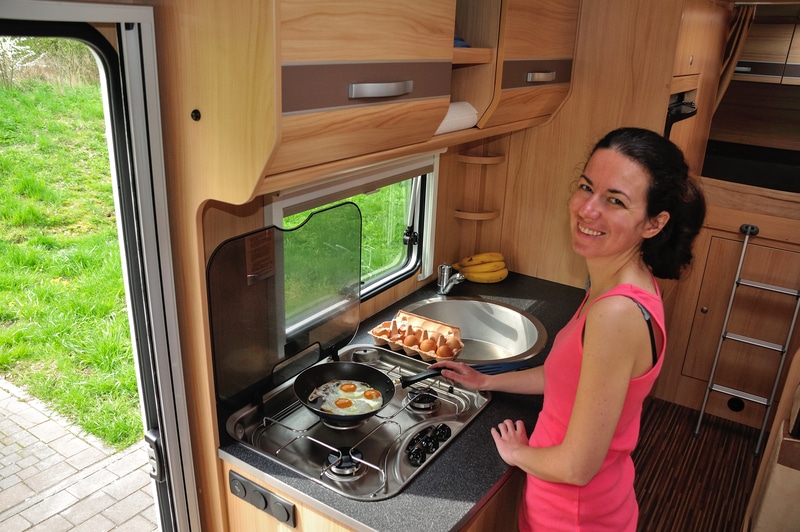
To run AC appliances like a refrigerator, you’ll need an inverter in your camper or RV to complete the job. Without that one inverter, you’ll have no way to transfer 12 Volt DC power into the 120 Volt AC power necessary to run your appliances.
Before purchasing an inverter for your RV fridge, you should learn more about converting DC power to AC power. The more you understand about electricity and how it relates to your RV, the easier time you’ll have using appliances on the go.
Please continue reading to learn everything you need about running your fridge on an inverter. We will discuss the safety, benefits, and disadvantages of using an inverter to power your RV fridge.
Running an RV Fridge on an Inverter
Does The Brand Of The Fridge Matter?
You can power any brand and type of refrigerator using an inverter in your RV. So, whether you want to power a small or larger refrigerator, you don’t have to adjust your power source.
However, the less power your refrigerator demands, the easier time you’ll have running throughout your RV travels.
You’ll need to check the wattage of your inverter to ensure that it’s compatible with the wattage demands of your refrigerator. Attempting to power a refrigerator on a lower-wattage inverter could cause permanent damage to the appliance.
You’ll also need to ensure that your inverter can simultaneously handle other appliances you plug in.
It would help if you considered your RV battery life before plugging your fridge into the RV’s inverter. The last thing you want to deal with is getting stranded in your RV because you depleted your battery.
It would be best to power your refrigerator using your inverter while you drive.
Benefits Of Running RV Fridge On An Inverter
Unfortunately, you can’t bring the power supply of an RV park on the go with you. However, you still have appliances you need to power even while you’re away from an RV park or campsite. The following are the benefits of running an RV fridge on an inverter.
- The battery life of your RV can keep your food cold by transferring from DC power to AC power.
- You’ll make fewer stops at the grocery store when you use an inverter to power your RV refrigerator throughout your trip.
- You can refrigerate food in your RV for weeks if you run your inverter on propane, which will have minimal damage to your RV’s batteries.
- If you need to run your refrigerator on your RV batteries, you have 12 hours to keep your food cool before you need to recharge your RV batteries.
Traveling the country in your RV is a fun activity you can do with the entire family. However, stopping and purchasing food all the time can get pricey. You’ll save money on grocery shopping and dining out when you run an RV fridge on an inverter.
Disadvantages of Using An Inverter To Power Fridge
Despite the advantages of running an RV fridge on an inverter, there are some reasons people steer clear of this idea. The following are the disadvantages of using an inverter to power your RV refrigerator.
- You need to be mindful of where your inverter receives power and how much power supply you can provide. For example, if you run your inverter on battery power, it’ll drain the battery life from your RV, which could leave you stranded. Alternatively, if you use propane to power your inverter, you need to keep an eye on how much propane you have in your tank.
- If using a larger fridge, you must ensure that your inverter has the refrigerator’s wattage requirements. It may be pricey to purchase an inverter that can power a large fridge and other appliances in your RV.
- You may need to set up the inverter, which will require professional installation. However, some RVs come with an inverter built in.
If you don’t want to spend money on professional installation, you may choose a different way to power your fridge. Installing an inverter in your RV is a lengthy process that requires someone with electrical knowledge to perform this task safely.
Can You Power an RV Fridge Without an Inverter?
If you’re nervous about setting up an inverter to run your RV fridge, you don’t have to worry. Many RB owners use alternative ways to power their fridges during their travels.
The most popular way to power an RV fridge without an inverter is to use a portable generator. There are plenty of generators you can bring with you on the road that are small enough not to interfere with your RV life.
How To Power Fridge With An Inverter
If you’re fortunate enough to purchase an RV with the inverter built into it, you don’t need to hire a professional to set up your technology. In this situation, you can plug your appliances in like a wall socket at home.
The power will already convert from DC to AC thanks to the built-in power inverter.
However, if you don’t have an inverter built into your RV, it would be best to hire an electrician to service it. Handling technology alone without experience can be risky and cause you injury. Any time you deal with wiring, you should hire someone who knows what they’re doing to set up the technology.
Before you plug your fridge into the wall, you must ensure that your inverter can handle your fridge’s wattage requirements.
Final Thoughts
The best way to keep your food cool throughout your road trip and your RV is to run your RV fridge on an inverter. An inverter will transfer the DC power of your RV into the AC power your fridge needs to operate.
You don’t need to pick a specific RV fridge to use an inverter; inverters are compatible with every brand and style.
Some RVs have an inverter built in, so you don’t have to hire someone to set things up. However, if you need to purchase an inverter for your RV, you should check the wattage requirements on the appliances you want to run.


